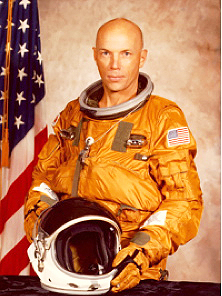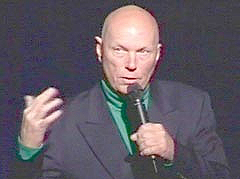 In a feature published on mlive.com, written by Jef Rietsma, the feature opens with "An old photo of a shirtless, diapered boy examining an insect seemed an unlikely visual to begin a speech by a NASA veteran with Hall-of-Fame credentials. But after the chuckling from an audience of about 100 people died down, Story Musgrave elaborated on the black-and-white picture as he spoke in Kalamazoo, Michigan, last Sunday on the 20th anniversary of the Hubble telescope launch.
In a feature published on mlive.com, written by Jef Rietsma, the feature opens with "An old photo of a shirtless, diapered boy examining an insect seemed an unlikely visual to begin a speech by a NASA veteran with Hall-of-Fame credentials. But after the chuckling from an audience of about 100 people died down, Story Musgrave elaborated on the black-and-white picture as he spoke in Kalamazoo, Michigan, last Sunday on the 20th anniversary of the Hubble telescope launch.
“There it is … the posture of exploration,“ he said. “That was me about 72 years ago growing up on the farm and I was in my own world.” Musgrave, 74, said his desire to explore and be curious were attributes he had from a young age, as the photo shot outside his childhood home in Stockbridge, Massachusetts, confirmed. Exploration and curiosity would be key traits that eventually led Musgrave to careers as a mathematician, a surgeon and a 30-year run with NASA.

Story Musgrave
“In the ’60s, when we knew nothing … we didn’t have the technology, we didn’t have the knowledge, we didn’t have the infrastructure, yet we were told ’You’re going to the moon,’ and we came up with a heavy-launch vehicle in four years,“ he said.
“Today’s program, what is the current administration proposing to get NASA access into space? It’s to think about a booster for five years and then make some decision about it,” Musgrave said. “Fifty years later, when we know the technology, we’ve got the infrastructure and we’ve got everything … we’re going to sit around and think about it for five years and then come up with some decision? If you look at every aspect of the current administration’s proposals for space, it’s afraid. It’s afraid to commit, it’s afraid to do anything,“ he said. “We’re not going to launch anything, we’re not going to build anything, we’re not going to do anything. We were afraid 50 years ago, but we had the will and the courage to move forward and it was simply ’Do it,’ and we did it.“
Musgrave said the 1960s was the most innovative decade in the history of technology, due to the country’s space program. Technology doesn’t happen just for the sake in a vacuum, he contends. Musgrave was inducted into the Astronaut Hall of Fame at the Kennedy Space Center in 2003.

